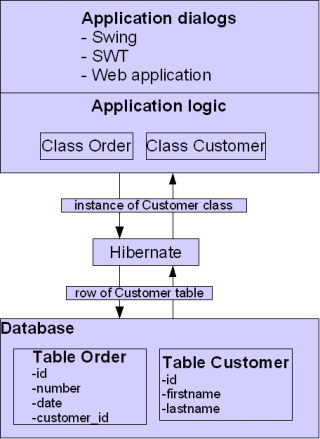Hibernateis a solution for object relational mapping and a persistence
management solution or persistent layer. This is probably not
understandable for anybody learning Hibernate.
management solution or persistent layer. This is probably not
understandable for anybody learning Hibernate.
What
you can imagine is probably that you have your application with some
functions (business logic) and you want to save data in a database.
When you use Java all the business logic normally works with objects
of different class types. Your database tables are not at all
objects.
functions (business logic) and you want to save data in a database.
When you use Java all the business logic normally works with objects
of different class types. Your database tables are not at all
objects.
Hibernate
provides a solution to map database tables to a class. It copies one
row of the database data to a class. In the other direction it
supports to save objects to the database. In this process the object
is transformed to one or more tables.
row of the database data to a class. In the other direction it
supports to save objects to the database. In this process the object
is transformed to one or more tables.

Saving
data to a storage is called persistence. And the copying of tables to
objects and vice versa is called object relational mapping.
objects and vice versa is called object relational mapping.